Please







Please






All embodied Mitzvah Day's theme for 2024 of ‘Stronger Together' - defying the forces which wish to tear us apart and, instead, uniting as one to support local charities and build bridges of commonality
More than 35,000 people of all faiths and backgrounds came out on Mitzvah Day to do good deeds all across the UK.
Those taking part in Britain's biggest interfaith day of social action included Prime Minister Sir Keir Starmer, Liberal Democrat leader Sir Ed Davey, London Mayor Sadiq Khan, Bishop of Edmonton Revd Canon Dr Anderson Jeremiah, Progressive Judaism Co-Lead Rabbi Charley Baginksy and Imam Asim Hafiz, the Islamic religious advisor to the Chief of the Defence Staff.
They were joined by tens of thousands of Jews, Muslims, Christians, Hindus, Baha'i and people of all religions and none in more than 2,500 projects encompassing care home visits, cooking for those in need, litter picks, cardwriting, park clean-ups, and food bank and winter clothing collections.
All embodied Mitzvah Day's theme for 2024 of 'Stronger Together' - defying the forces which wish to tear us apart and, instead, uniting as one to support local charities and build bridges of commonality.
Mitzvah Day Founder and Chair Laura Marks CBE said: "After a truly challenging year, on Mitzvah Day our faith communities did what we do best - we came together to give back.
"It was so heartening to see our most senior leaders from across the religious and political

spectrum put on their green T-shirts, roll up their sleeves and join us in these acts of citizenship, community-building and helping those who need us most."
Siobhan Garibaldi National President of the Catholic Women's League and co-ordinator of the SVP Vinnie Packs welcomes Mitzva Day. She told ICN: "In the past children from several Jewish and Catholic schools have gathered together to fill hundreds of Vinnie Packs for us. (Emergency cold weather packs given out to homeless people containing hats, socks, gloves, toothbrushes and other useful items) Its a wonderful opportunity for pupils of different faiths to get together and realise how much they have in common."
Prime Minister Sir Keir Starmer wrote a personalised thank you card for the staff of Spring Grove Care Home, which was then hand-delivered by the home's local Labour MP Tulip Siddiq, Economic Secretary to the Treasury, during a Mitzvah Day musical event for residents and their families.
The Prime Minister said: "Mitzvah Day is a day of service, uniting thousands of people from different faiths and backgrounds to do good in support of those in need. No matter the challenges we face, and no matter what our differences may be, we are always stronger together - and I am incredibly inspired by the volunteers taking part."

Sir Ed Davey took part in an intergenerational ballet dance to bring cheer to the residents of Nightingale House Care Home. He was joined in the dancing by Mitzvah Day Chair Laura Marks CBE, youngsters from the Apples and Honey Nightingale nursery and the residents themselves.
The Liberal Democrat leader said: "It was a delight to join the community at the Nightingale Care Home to mark Mitzvah Day, and to see the generosity of spirit reflected in so many acts of kindness across the country. The theme of this year's Mitzvah Day, Stronger Together, is a timely reminder that we all have much more in common than divides us."
In a flagship interfaith event, London Mayor Sadiq Khan packed 'Create and Make" boxes filled with fresh vegetables for people supported by the Mayor's Fund for London, joined by Deputy Mayor Debbie WeekesBernard and volunteers from the Jewish and Muslim networks at City Hall.
Elsewhere Imam Asim Hafiz, Rabbi Charley Baginksy and Bishop of Edmonton Revd
Canon Dr Anderson Jeremiah came together in a show of solidarity at care home Hammerson House where residents and volunteers - including from Caritas Westminster, the Roman Catholic Diocese of Westminster and local Jewish communitiespacked for Food Bank Aid and sang and danced together.
Rabbi Charley Baginsky said: "This was a heartwarming event on a very special day. Mitzvah Day provides us all with an incredible opportunity to take part in making the world a little bit better and remind ourselves how much stronger we are when we work together."
Imam Asim Hafiz said: "Whether through zakat in Islam or tzedakah in Judaism, our shared traditions remind us that caring for others is not just an act of kindness but a sacred duty. Mitzvah Day beautifully reflects these shared values, bringing us together to strengthen our communities and make a meaningful difference."
Continued on page 5


CONTACT US:
The Catholic Post is published by its owners Bellcourt Ltd and is wholly independent of and separate from any previous newspaper. The Catholic Post is published on the last Sunday of the month previous to publication date.
EDITOR:
Nick Layton
email: editor@catholicpost.co.uk
ADVERTISING:
Charlotte / Bellcourt Ltd. 01440 730399
charlotter@cathcom.org
DESIGN & LAYOUT:
David Lodge, davidl@cathcom.org
PUBLISHED BY:
Bellcourt Ltd. N2 Blois Meadow Business Centre, Blois Road, Steeple Bumpstead, Haverhill, Suffolk CB9 7BN 01440 730399
ARTICLES TO:
The Catholic Post email: editor@catholicpost.co.uk or davidl@cathcom.org
Please send articles for publication by email, supplying any photos separate to the text We welcome contributions
Here are answers to some basic questions about writing for The Catholic Post How long should articles be?
Usually it seems to work out best if contributors simply say what they have to say and let us worry about finding a spot for it in the paper. What is the submission procedure?
Please send as a Word file attached to an e-mail. To submit articles for publication, send to editor@catholicpost.co.uk
Charts, graphs, and photos should be submitted as separate PDFs. Electronic photos should not be embedded or pasted into a Word document as this reduces their quality.
Photographs and Illustrations
Photographs and Illustrations should be supplied electronically as high resolution JPEG (*.JPG) files).
Photographs and illustrations should be sent in colour with a resolution of 300 dpi and a minimum size of 100 mm x 100 mm when printed (approx. 1200 pixels wide onscreen).
Computer print-outs are not acceptable. Screen captures are not ideal as they are usually not very high
Parental permission should be sought before submitting photographs of minors. Source information -
DW = Diocesan Website.
ICN = Independent Catholic News
Views expressed in The Catholic Post are not necessarily those of the editor Last date for copy is the LAST DAY of the month prior to publication.

“At all times the Church carries the responsibility of reading the signs of the times and of interpreting them in the light of the gospel”.
In the (2011) translation of the Roman Missal, in the third ‘Eucharistic Prayer for Use in Masses for Various Needs’, are the words: “Grant that all the faithful of the Church, looking into the signs of the times by the light of faith, may constantly devote themselves to the service of the Gospel. The previous translation read: “Keep your Church alert in faith to the signs of the times and eager to accept the challenge of the gospel”. I have no idea what the original Latin text was, but for once I think the new translation is a considerable improvement on the old.
Whenever I use that Eucharistic Prayer in the Mass, I’m always struck by those words. In the original version, the prayer seemed to be asking simply that we be on the watch for the signs of the last times, living our lives according to the gospel in preparation for Our Lord’s Second Coming. The words of the new translation seem to me to suggest the need to look at what can so often seem to be the darkness (indeed the godlessness) of our times, and to look at them instead with the eyes of faith and trust in God.
I came across a website that quoted Fr Donald Dorr writing in The Furrow back in October 2008, commenting on the phrase “the signs of the times”. He noted that it occurred in St Matthew’s gospel (16 v 3) when Our Lord criticised the lack of perception, indeed the lack of faith, of the people saying: “You know how to read the face of the sky, but you cannot read the signs of the times. It’s a phrase that we also meet right at the beginning of the Second Vatican Council’s document Gaudium et Spes (The Church in the Modern World): “At all times the Church carries the responsibility of reading the signs of the times and of interpreting them in the light of the gospel”. Given that we are “church”, that responsibility is ours also.
The phrase a sign of the times often reflects a passive acceptance of how things are, that the situation is beyond our ability to bring about change for the better. Some examples might be:
• The general disregard that there is for Sunday being a day special to God. A long time ago in the process we – the Christian church and the Christian community - should have made our influence felt but we didn’t, and now all we can do is accept the fact that Sunday is widely regarded as just another day of the week is a sign of the times.
• The World Health Organisation estimates that, worldwide, between 40-50 million abortions are carried out every year, that’s 125,000 a day. Another sign of the times.
• A 2014 British Social Attitudes Survey showed that about one-in-ten of the population is Catholic of which only 40% are churchgoing on a regular basis. That too is a sign of the times.
This is where looking into the signs of the times by the light of faith comes in. As people of faith we can choose to be part of Our Lord’s redeeming work. Taking a couple of those same examples:
• We can exercise our power as voters against legislation that is counter to our Christian faith and Christian morality. It may seem a lost cause to try fighting an entrenched party policy, but doing nothing shouldn’t be an option for us.
• What can we do to try to encourage the lapsed back to the practice of their faith? It might be the quiet example of our own faith practice, or it might take a kindly word or a direct invitation, but if we do nothing we’ll never know.
We can very easily become discouraged by what we see going on in the world and in
society around us, but we have to be more hope-filled, and faith-filled, than that. Our faith provides us with a very different perspective –we can choose to look at things in a different way. This isn’t being unrealistic, it’s being hope-filled. We can also bring prayer into the picture, praying for situations and circumstances that other people might consider to be a lost cause, given that with God all things are possible. And, of course, this applies not only to the signs of the times, but to any and all situations that we encounter or are concerned about. Our faith shines a very different light on things and as a result we just never know what might be possible.
As I said above, by looking into the signs of the times by the light of faith we inject hope into situations. We bear witness to the fact that Our Lord has redeemed all of creation, that no matter how much godlessness there seems to be in the world, God is always there if we would only help to reveal his presence. And we need to do that for ourselves also so that we don’t become despondent or disillusioned.
There is also an implication that we don’t ever have to be apologetic for, or accepting of, what we see going on around us. We are people of faith – faith is our starting point – therefore both our incentive and perspective are always going to be a little different from that of other people. Consequently, and necessarily, we see the world in a different way – through the eyes of faith and in the light of faith – and we need to constantly renew our prayer for the grace to see things, and to deal with things, in that way.
Your word, Lord, gives light for my feet, it shows me the way I should walk.
Almighty God, you are all light, in you there is no darkness.
Let your light shine upon us in all its radiance, so that we may walk gladly in the way of your commandments.
Grant that all the faithful of the Church, looking into the signs of the times by the light of faith, may constantly devote themselves to the service of the Gospel.
The aim of the 50 Faces Exhibition was to deepen understanding of the complex situation in the Holy Land and raise awareness of the
plight of our brothers and sisters there
Archbishop Mark recently attended Ecumenical Vespers with the former Archbishop of Canterbury, Rowan Williams and other church and local dignitaries. The event was hosted at St David’s Metropolitan Cathedral in Cardiff.
The event coincided with an exhibition that was run by the Friends of the Holy Land. The aim of the 50 Faces Exhibition was to deepen understanding of the complex situation in the Holy Land and raise awareness of the plight of our brothers and sisters there, with the hope of generating greater support for their mission. The photographs were taken by Marcin Mazur of the Bishops’ Conference. Given demand the exhibition ran until the 28th October.

At Vespers, Archbishop Mark and other attendees prayed for peace and reconciliation in the Holy Land. The Cathedral Choir sang beautifully, and Lord Rowan Williams delivered a powerful and thought-provoking homily, linking the 50 faces featured in the exhibition to the face of God.
He explained that the exhibition invites us to look into the eyes of strangers, whose faces reflect God’s image. He challenged us to ask: Where do we see the face of God? In the human images of God, including our enemies. Recognising God’s face in our adversaries, he argued, is a vital step toward peace. Lord Williams implored us to trust in the God who has revealed His face to us.
After the service, a Q&A session was held in the Mostyn Room, where Brendan Metcalfe,
CEO of Friends of the Holy Land, provided an update on the current conditions in the region and invited questions from attendees. The war in Gaza has caused utter devastation and Brendan told us of the precarious situation for Christians who have decided to stay. We were told of the large numbers of Christians who are sheltering in churches there; of the thousands of people in Gaza who had lost their jobs because they no longer get work permits and how tourism, which supported so many families, had logically and sadly shut down. However, he also told us that the donations from people helps them support new businesses and help to improve water supplies.
To help support the work they do go to www.friendsoftheholyland.org.uk/Appeal/chris tmas
dioceseofleeds.org.uk
The books used in Mass for readings and the sacraments have been updated using a different translation of the original text. From the start of Advent this year, all Masses will use the English Standard Version as it is felt to be a more accurate translation which is easier to proclaim. The readings themselves remain the same but the translations of them are different.
The Diocese of Leeds have used this opportunity to provide some ‘refresher training’ for those who read at Mass –whether they are clergy or members of the laity. They have created three short videos on YouTube, available for anyone to watch, to give an introduction to the new lectionary and to act as a training guide for readers.
The first video, introduced by Bishop Marcus, is a general description of the new Lectionary and the sacred task of proclaiming God’s Word in Scripture. It is presented by the Year of the Word Scripture Champion, Fr Henry Longbottom.

In the second in this series, Fr Henry reminds laity of the importance of prayerful preparation to ensure the reader fully comprehends the meaning and emotions inherent in the Scripture readings, so as to give a clear, unhurried, and expressive proclamation which will be readily understood by the congregation. Reading exactly and only what is printed in black in the Lectionary, without any distracting ‘instructions and introductions’, allows the liturgy to flow and the Words of Scripture to speak for themselves. With a demonstration by Rowan Morton-Gledhill - Diocesan Director of Communications.
Bishop Marcus introduces the final video in the series as an opportunity for both new and experienced priests and deacons to inspire afresh all who hear them proclaim the Good News of Our Lord Jesus Christ. With a Gospel proclamation demonstrated by Fr Simon Winn.
To visit their website and watch the videos, use this QR code:

It is astonishing how one lone candle, in an unlit room, gives us direction. Its light fills the darkness with warmth and comfort. We know where we are and which way to go. One small candle drives away the darkness and quietens our fear. Light gives us hope.
We too can be candles of light and hope. We too can dispel darkness. Christmas and the dawn of the New Year is a time to light a candle in the lives of others around us.
Is there someone that we have forgotten in our busy lives? Is there space at our table for one more? Is there someone nearby who will be on their own? Is there a relative or old acquaintance whom we have not heard from recently, who would really appreciate a call?
Where do we find Jesus today as we celebrate his birth? Where do we meet with him? He is in all those whom we could pop in to visit, those whom we could stop and share a moment or two with. He is there in the smallest and the weakest and those on their own, at the darkest time of the year.
We CAN carry light to others. We CAN push back the darkness. We can find Jesus.
‘ I said to the man who stood at the gate of the year: "Give me a light that I may tread safely into the unknown".
And he replied: "Go out into the darkness and put your hand into the Hand of God. That shall be to you better than light and safer than a known way".
So I went forth, and finding the Hand of God, trod gladly into the night. And He led me towards the hills and the breaking of day in the lone East.’
www.crownofthorns.org.uk email:office@crownofthorns.org.uk
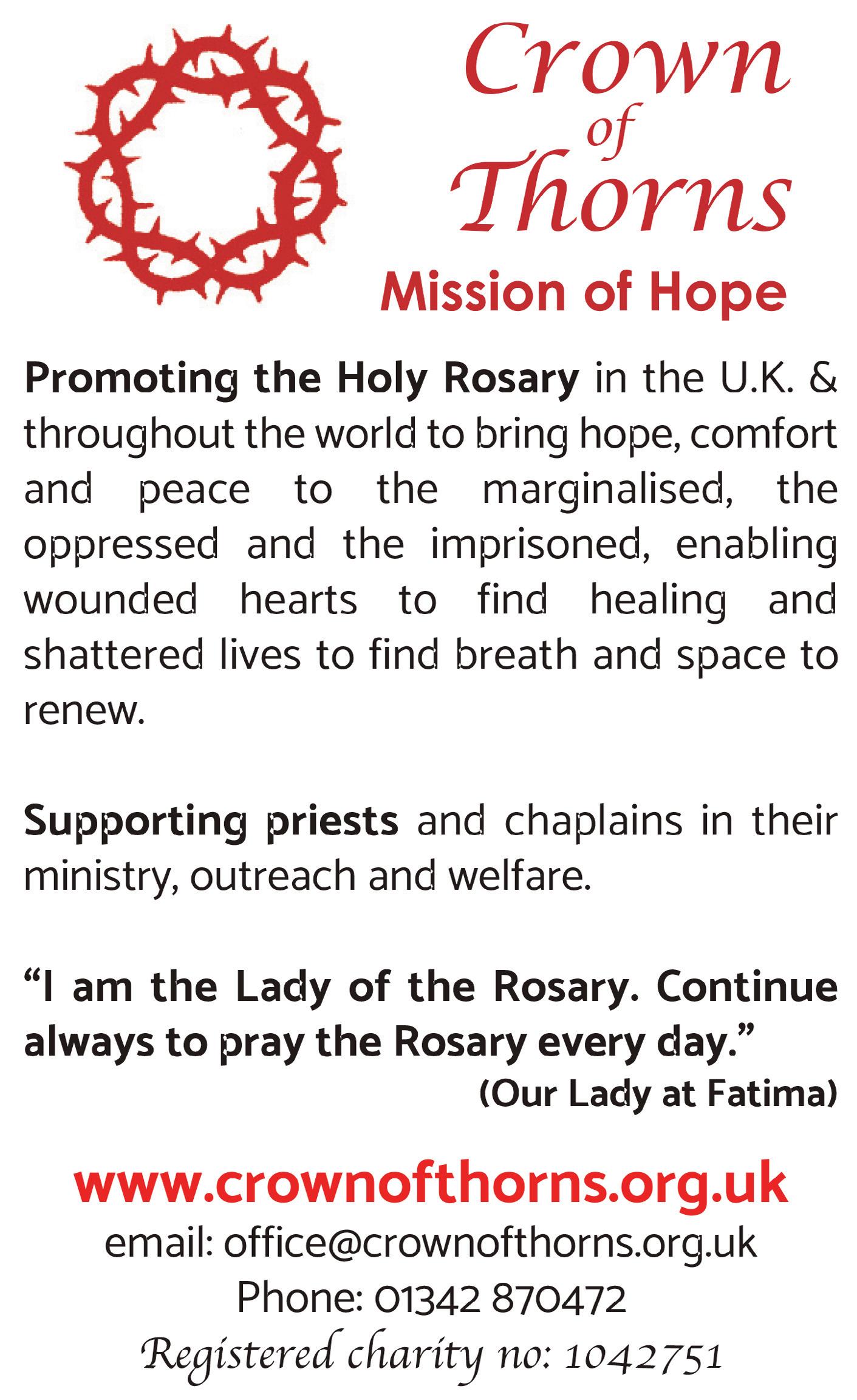
rcsouthwark.co.uk
“We
would be pleased to exchange ideas with other parishes and to learn from their experiences.”
A Southwark parish has launched a new toolkit empowering Catholic parishes to promote racial and cultural inclusion in all their activities and worship.
Saint Margaret of Scotland Parish, Carshalton Beeches, is a South London parish whose demographic has changed significantly in recent years as it has welcomed more Catholic faithful from Africa, Asia, Latin America, the Caribbean and Eastern Europe. Fr Anthony Uche, Parish Administrator of St Margaret’s, says: “We hope that this Toolkit will be of assistance to anyone wishing to promote racial and cultural inclusion more effectively in their parish. Steps to promote racial and cultural inclusion will need adaptation from one area to another. However, the overall approach which we describe is likely to be appropriate for many Catholic parishes. We would be pleased to exchange ideas with other parishes and to learn from their experiences.”
The toolkit has been produced with the support of the Southwark Archdiocese’s
Commission for Promoting Racial and Cultural Inclusion. The Commission’s Chair, Canon Victor Darlington, says: “The Catholic Church has a crucial role to play in speaking out against racism and promoting racial inclusion. Racism is a sin and has no place in our world. As followers of Christ, it is our duty to welcome all people, regardless of race or background, into our Church. Saint Margaret’s, Carshalton Beeches, are leading the way in putting the message of welcome and inclusion into practice. It is wonderful to see how they have transformed their parish into one which is more inclusive, welcoming and reflective of the people they serve. I am delighted with their toolkit, which is designed to provide practical and helpful tips for parishes to ensure they are welcoming to all.”
The toolkit provides comprehensive practical advice and includes details of website links and resources (many available free of charge). This includes advice on setting up a parish racial and cultural inclusion group; welcoming new parishioners; obtaining racially diverse pictures,

statues and Repository items; ensuring diversity in parish ministries; dealing with racial incidents; and organising multi-cultural celebrations and events.
Andrea Fernandes, Co-Chair of the St Margaret’s Racial and Cultural Inclusion Group, commented: “Our approach emphasises that the racial and cultural diversity of a parish is a blessing from the Lord; that the experiences, traditions and worship of different racial and cultural groups can enrich the life of a parish; and that the whole parish benefits from the experience of racial and cultural inclusion.”
The toolkit can be accessed free of charge by using the QR code below and on the Saint Margaret of Scotland Parish, Carshalton website. A limited number of hard copies are available, price £12.50 including postage, from the Parish Office, Saint Margaret of Scotland Church, Fir Tree Grove, Carshalton SM5 4NG.

“We go to sleep to the sound of sirens, and we wake up to the sound of sirens and bombings. The sirens sound nonstop. Psychologically, people are tired, very scared and without hope."
A Brazilian missionary priest staying in Ukraine's capital despite the dangers has shared moving details of what life is like today in the war-torn country.
Father Lucas Perozzi has refused to return to his native Brazil, rather remaining in Kyiv to minister to the faithful who increasingly "need hope" after more than a thousand days of fighting.
Father Perozzi told Aid to the Church in Need (ACN): “We go to sleep to the sound of sirens, and we wake up to the sound of
sirens and bombings. The sirens sound nonstop. Psychologically, people are tired, very scared and without hope."
He added: "Then there is also the problem of the economic crisis. Things are increasingly expensive, it is a very difficult situation."
The priest said that people have gradually got used to the sound of air raid warnings and no longer seek safety in the bomb shelters - at great personal risk.
He explained: "You can't live like this. For the first six months we used to run to the bunkers, but not anymore. When our time comes, it will come. Only God knows the hour. It could be a missile or a heart attack."
He added: "God is the Lord of life. That's reality, and we have come to accept it."
Father Perozzi said that his "mission… to spread the Gospel… isn't easy".
He told ACN: "People need hope, they need God, the sacred", but it seems that "nothing consoles them anymore. They have given up searching. They have become apathetic, disillusioned."

ceived much-needed support from ACN, including "help to hold summer camps for children, which is very important, because they are living in a state of constant alarm.
"In my parish we held a camp in the mountains, where there are no air raid sirens, no missiles, and they can rest, they can play, speak to each other, and we can provide pastoral care, such as Masses and catechesis."
ACN has also provided trauma counselling programmes to help people cope with the horrors of war.
to be able to work with people who were on the frontline, with parents who lost their children, children who lost their parents… This is a new issue for us. But we do everything with gratitude - I am happy with my mission, and ready to carry it out."
He concluded: "As long as we are alive, we have the mission to proclaim the Gospel."
With thanks to Paulo Aido
dioceseofsalford.org.uk
“It came as a complete surprise to me, and the citation read aloud in the Cathedral by Paul Connolly was moving to hear.”
A priest of our diocese has been made a Fellow of the Catholic Police Guild after more than 20 years of service with Greater Manchester Police.
Fr Barry Lomax, a diocesan priest and Force Lead Chaplain for GMP, was made a Fellow of the Catholic Police Guild at their annual National Requiem Mass, celebrated in Westminster Cathedral, London.
The Fellowship is the Guild’s highest honour and the National Executive Committee voted unanimously to present the award to Fr Barry, who has served as a Police Chaplain with Greater Manchester Police since 2001.
Fr. Barry said: “I was honoured to receive the Fellowship from Rt Rev Alan Williams SM, Bishop of Brentwood. It came as a complete surprise to me, and the citation read aloud in the Cathedral by Paul Connolly was moving to hear.”
In his citation announcing the decision, Paul Connolly, National Chair of the Guild, described Fr Barry as “someone who has provided long and meritorious service or in some special way
has enhanced the standing of the guild.”
He added: “Since 2013, he has been the National Chaplain to The Catholic Police Guild and his help and advice to me, my predecessors as Chair and those both in the Guild and not in the Guild, can never be measured.
“I know for certain that over the many years of service, both to his home force and the Guild nationally, he has offered his guidance and wise counsel and can be counted upon always to be available and to act as a ‘sounding board’ and a true confidant to all.”
For the past 23 years, Fr Barry has served as a chaplain for Greater Manchester Police, providing a listening ear and much-needed support for force officers and staff of all faiths and none.
Last year, Fr Barry left behind parish life and embarked on a full-time position with the force to head up and grow the chaplaincy service at GMP.
Born in 1567 in Savoy, St. Francis de Sales became a shining example of holiness, wisdom, and compassion. Despite his family’s ambitions for him to pursue law, Francis followed God’s call to the priesthood, dedicating his life to spreading the Gospel with gentleness and love.
As the Bishop of Geneva during the Reformation, Francis faced fierce opposition in a region torn by religious division. Through tireless preaching and personal example, he converted thousands, using reason and kindness instead of force. His extraordinary patience and ability to connect with people earned him the title “The Gentleman Saint.”
Francis’s spiritual writings, including Introduction to the Devout Life, revolutionized Catholic spirituality by showing that holiness is possible for

everyone, regardless of their state in life. He taught that ordinary tasks, done with love and devotion, could lead to sanctity.
A man of profound faith, Francis lived by his belief that “nothing is so strong as gentleness, nothing so gentle as real strength.” Canonized in 1665 and declared a Doctor of the Church, St. Francis de Sales continues to inspire countless souls to seek God through humility, perseverance, and love. His legacy is a testament to the power of grace and compassion.


Continued from page 1
Other key multi-faith events included a full day of activities for refugees in Cumbria, a cook-a-long organised by Edgware & Hendon Reform Synagogue and Neasden Temple, Harrow Interfaith's litter collection, support for the warm food café at Moortown Baptist Church in Leeds, six organisations uniting for a community tea at Brighton & Hove Progressive Synagogue, collaborations between Northwood & Ruislip United Synagogue and Elim Church, and meal preparation at the C4WS night shelter with Minister for Faith Lord Wajid Khan.
Mitzvah Day projects ran in 40 other countries around the world, including Germany, South Africa, Australia, Ukraine, Spain, Canada and across South America.
Chief Rabbi Ephraim Mirvis, Scotland's First Minister John Swinney and senior members of the Conservative Party were among those paying tribute to all those who took part.
The Chief Rabbi said: "Mitzvah Day is one of the greatest initiatives of the British Jewish community. Thanks to Mitzvah Day, people are showing kindness and doing so many amazing things."
The First Minster said: "There is so much that unites people of faith, and so much that we
have in common. This day of social action recognises the centrality of community, of strong relationships, of compassion, and of reaching out a helping hand."
Bob Blackman MP, Secretary of the 1922 Committee, joined an interfaith gardening project run by Stanmore and Canons Park United Synagogue. He said: "Mitzvah Day is brilliant because it brings the whole community together to do things they may not usually be doing."
Looking back over a hugely successful day, and a whole month of projects and events in its lead-up, Mitzvah Day CEO Stuart Diamond reflected on what makes it so special.
He said: "Mitzvah Day is a joyful experience that inspires people to give back to their communities. It's a reminder that even small acts of kindness can have a big impact."
Bishop John Sherrington, who attended the launch of the event in Barnet, north London in July commented: "I was delighted to join the Mitzvah Day launch and meet Barnet's interfaith leaders. The opportunity to stand together in solidarity for the most vulnerable in society is a call we can share across our faiths and is to be encouraged."
Simon Rothstein
The Vatican’s first day care centre is to begin operating next spring and will serve up to 30 children ages 3 months to 3 years
The employees who work behind the walls of the smallest country in the world will now have a day care center for their children.
According to the Vatican Governorate, this initiative represents a new stage in support for families, which responds to the needs of employees and provides them with “a safe and enriching environment for their children.”
The Vatican’s first day care centre is to begin operating next spring and will serve up to 30 children ages 3 months to 3 years.
The aim of the new center is to help families with the growth and comprehensive education
of their children. Parents will be able to leave their children with an educational team that “will help stimulate knowledge, skills, and autonomy appropriate to each stage of their development,” the statement said.
The center will be called “Sts. Francis and Clare” and will be located in a building on Via San Luca, inside the Vatican. It will be open Monday to Friday from 7:30 a.m. to 6:30 p.m., and activities will be held in Italian and English.
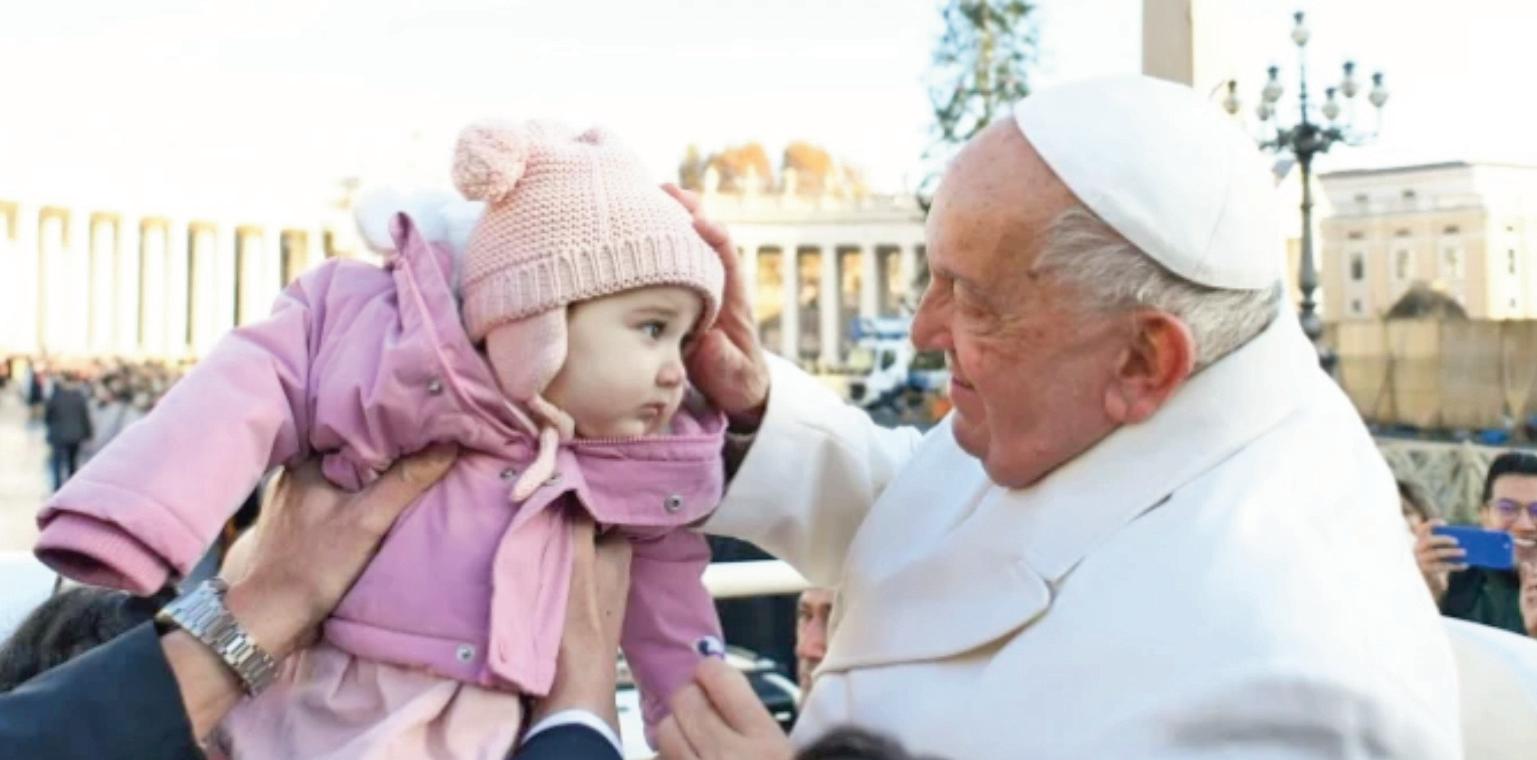
At the Vatican, more than 4,000 are employed in various functions, including religious staff, administrative employees in the dicasteries of the Roman Curia, and members of the Swiss Guard as well as workers in finance, landscaping, food service, maintenance, and health care, among other areas.
During the Christmas audience with Vatican employees last year, Pope Francis expressed his gratitude for the work of all these
employees, highlighting in particular the effort they make “in the obscurity of everyday life,” carrying out tasks that, although they may seem insignificant, “contribute to offering a service to the Church and to society.”
Saudi Arabia has been named as host of the 2034 football World Cup - the second Gulf state to be awarded the quadrennial honour, surpassed only by the Olympics in size. But behind the fanfare and out of sight of most of the fans, the country - with documented concerns around the world over its human rights - will rely heavily on migrant workers to get the job done.
Keir Starmer called for closer ties with Saudi Arabia to bring trade benefits to the UK. But the questions for the British government and the global footballing community are these: what does 'sharing best practice' look like with Saudi Arabia over the next nine years? And what price the lives and rights of the most vulnerable within Saudi society.
According to Human Rights Watch, migrants made up more than 80 per cent of Saudi Arabia's private workforce in 2022 - over 6.3 million workers, mostly in construction, retail and domestic jobs. Since 2019, around one in three came from Bangladesh, with nearly half a million - mostly men - recruited last year alone. The money they send home is vital to Bangladesh's economy. But many who travel to Saudi Arabia return home bruised and broken by the experience; their dreams of lifting their families out of poverty shattered.
Sariful, 20, the eldest of five, was studying at college in Bangladesh but his family could no longer afford the fees. He met a recruiting agent who promised him wages of £350 a month in Saudi Arabia.
“I was desperate to earn money for my family," says Sariful, "so I accepted his offer. He asked for 500,000 taka (about £3,300). My family took loans from money lenders and relatives to pay him."
Unscrupulous recruiters from countries like Bangladesh often send victims to Saudi Arabia without a work permit. When Sariful arrived in Jeddah there was no job. Instead, he found himself confined, tortured and abused with little to eat or drink. It was two years before he was able to make contact with his family, when the recruiter pressured them for an additional £450 to 'find Sariful a job'. "My family borrowed more money, but nothing changed. I was still locked up and beaten."
Eventually he escaped and found work at a construction site, but tragedy struck when ten days into the job he broke his elbow in an accident on site. The employer offered no support, and his mother borrowed yet more money to bring her oldest son back to Bangladesh.
"I returned home broken, both physically and emotionally," says Sariful. "I sacrificed my education and future, and became a victim of lies, exploitation and cruelty. My family is now drowning in debt, with no way to repay the 650,000 taka (about £4,300) we borrowed. My arm hasn't properly healed, so I can't work to support them."
Under the 'kafala system' in Saudi, employers could take migrant workers' passports, making it impossible for them to change jobs or return home. The practice has been declared illegal by the Saudi government, but there are limited mechanisms to prosecute offenders, and
workers often face physical, mental and sexual abuse, exploitation and withheld wages.
In March 2021 Saudi Arabia introduced reforms to allow some workers to change jobs without employer consent, but enforcement is weak, leaving many trapped in exploitative conditions.
Women domestic workers are particularly isolated. Some are forced into the sex trade on arrival, while others face physical, mental and sexual abuse in their employers' homes. Many are forced to work in several different houses without pay and can be accused of 'absconding' if they leave the house without permission. Those who complain to the police are often handed back to their employers, where they face further punishment.
Habibullah was already a skilled construction worker when he sold his wife's jewellery and mortgaged a small piece of land to pay a recruiter. The trafficker promised Habibullah's experience would be 'valuable' in Saudi Arabia. "My Saudi employer took my passport and made me work 12 to 14 hours daily, often without food or water under the burning sun," he says. "My hands became raw, and I was exhausted."
Fearing the sack, Habibullah continued working even when his wages went unpaid for months: "I felt trapped and helpless. I had no money to return home and couldn't leave the job - or the country - because they held my passport."
Worse was to come for Habibullah, when he was seriously injured at work after falling from
the third floor of a part-finished building, fracturing his neck.
"Instead of helping me recover, the company washed their hands of me. They sent me back to Bangladesh, broken and penniless," he says. "Now I lie in bed, unable to move, unable to work. We can't pay back the debt, and my family has been struggling to survive. My children have dropped out of school and my wife works as a day labourer to feed me, my children and my parents. I didn't receive any compensation or justice for what happened to me."
Since 2016 CAFOD has supported a Bangladeshi organisation, OKUP, which promotes safe migration and works to end labour trafficking, forced labour and modern slavery.
This is the backdrop to the World Cup announcement, and to Keir Starmer's 'free trade' hopes. Both are worthy of further scrutiny, and serious issues must be addressed before anyone declares a 'win'or this week's celebrations risk being ruled offside.
Shakirul Islam is a researcher and migrant activist in Bangladesh who has been campaigning for migrants' rights for over 20 years. He is the founding chairperson of Ovibashi Karmi Unnayan Program (OKUP), a grassroots migrants' organisation working to raise the voices of migrant workers, their families and their communities at all levels, to ensure rights, justice and dignity for all. CAFOD has been supporting this work with OKUP since 2016.
There are just four bakeries in Gaza City for 400,000 people, so access to food and water is very restricted
An international audience of around 200 people listened in admiration and silence on 27 November as a live webinar heard Fr Gabriel Romanelli, Parish Priest of the Holy Family Parish in Gaza, and Sami El-Yousef, Chief Executive Officer of the Latin Patriarchate in Jerusalem and the first lay person to hold the post, speak about their experiences in the Holy Land over the past year. Gaza had seen 33 deaths in the previous 24 hours of the IsraelPalestine conflict.
They shared their struggles, hopes, and resilience in an online event organised by Pax Christi England and Wales, Pax Christi International and Passionists. Joint chairs were Ann Farr of Pax Christi and Paschal Somers of the Passionists.
Comments in the chat included: "What a huge privilege to see and hear you today. I watch the Holy Family Facebook everyday and I'm in total awe of your inspiring resilience."
Fr Gabriel talked of the "very important mission" of the Holy Family Parish in Gaza, its only Catholic parish. "Tradition has it that the Holy Family travelled through Gaza to Egypt and then again on the return to Palestine, so they were here at least twice," he said. Today, there are around 650 Christians in the Gaza Strip - most of them Greek Orthodox - of the enclave's total population of 2.3 million. The Greek Orthodox church of Saint Porphyrius is just 400 metres away. "We share food and medicine," he said; "so we are really an ecumenical parish." And there are close links with the majority Muslim population of Gaza, particularly those living near the parish.
The Holy Family parish has been a refuge for hundreds of people since the beginning of the conflict in October 2023. This number then increased with Christians being taken in from Saint Porphyrius after this third-oldest church in the world was bombed twice, killing civilians seeking sanctuary there. With the Catholics, that makes around 500 people currently living in the Holy Family church. Fr Gabriel reported that "we had three bombings here - especially in Mother Teresa House - but thank God no children were wounded." However, "we are close to bombing and there is often shrapnel around." His parish lost its generator and the majority of its solar panels in attacks.
There clearly is little or no heating in the parish. Over the course of the webinar, Fr Gabriel put on his coat, then a woolly hat, and then wrapped a thick scarf around his neck. He explained that families were settling down for the night all around him. A family lived at the other side of the curtain behind him. "Every space is taken up," he reported.
Comment in chat: "For all who are taking refuge in the churches and for those that have
nowhere to go and for all those who are grieving. Lord Have Mercy."
Fr Gabriel pointed out that Gaza was called a prison even before the current war. "This has been a reality for many years," he said, "and now "Gaza Strip is a cage and no one can go outside." He reported that very few people can come and go. The community has lost 45 people over the past year and two Catholic women who had actually been sheltering in the church were killed by a sniper of the Israeli Defence Forces.
The Israel-Hamas war has killed more than 44,000 people in Gaza since October 2023, Palestinian health officials say. More than two million people in Gaza do not have enough to eat. Fr Gabriel described the past year as "catastrophic", and "it is not easy for 500 people to all live together." The majority of people in the packed church "have lost their places of work, their streets, everything." There are just four bakeries in Gaza City for 400,000 people, so access to food and water is very restricted. "It is very rare that people eat meat," he said, "and if they do it is corned beef, which is difficult to obtain."
The parish has a daily Mass with a homily, daily Rosary and one hour of silent adoration everyday. "We continue to pray and to nourish hope and we try to keep morale high although we hear bombing daily," he said. "Our mission involves caring for all ages" he added; "each day we visit sick and elderly people and more than 50 disabled children who shelter with us."
The parish centre for youth training is now closed. Outside the parish, Gaza's Anglican hospital "is very important to us."
Comment in chat: "Please keep hoping. Please stay in the Holy Land. You are our mother Church. Let us hope to see a cease fire as soon as possible with humanitarian help as well."
Sami El-Yousef is a 'Living Stone'. His family is one of the oldest Christian families in Jerusalem, tracing its history back many centuries in the region. He gave an overview of the work of the Latin Patriarchate of Jerusalem, which runs 60 parishes and 44 schools, with 200,000 Catholics in Israel, Palestine, Jordan and Cyprus.
The Latin Patriarchate of Jerusalem launched a large-scale emergency humanitarian relief initiative in May 2024 to address the urgent needs of the Christian community in Gaza. It has been delivering food - including fresh fruits and vegetables - and hygiene supplies. This month, the relief initiative delivered critical support to over 1,000 families from the Christian community and neighbouring areas near the Holy Family compound.
Regarding the West Bank, he spoke about the collapse of pilgrimages/tourism over the past year, which supported many livelihoods in the West Bank. In addition, "people can't get permits to work in Israel and civil servants in the West Bank are not receiving their salaries," he said. It is thought that Israel is holding money back. The Patriarchate is supporting tens of thousands of people, "giving food, providing cash for work and utility support," Sami reported. "We're trying to help people support themselves," and the Latin Patriarchate is currently appealing for funds. He told listeners that in the countryside settler violence has mounted with regular confiscation of land and harassment of Palestinians.
Some Palestinian families have left the region. However, despite the challenges, Sami said, "we are here to stay and there are plans for our work to increase after the war." He reflected that Palestinian Christians are calling "for tolerance, peace, justice" and added, "where else do you hear this?"
Comment in chat: "How will you celebrate Christmas? How will you echo the glad tidings?"
Fr Gabriel reported that the Holy Family parish is planning carols with teenagers and chocolates for all the children. "We will try to celebrate," he said.
Last week, the Patriarchs and Heads of Churches in Jerusalem issued a statement on the commemoration of the religious observances of Advent and Christmas in the midst of the continuing war. They said: "We encourage our congregations and people to fully commemorate the approach and arrival of Christ's birth by giving public signs of Christian hope. At the same time, we also call upon them to do so in ways that are sensitive to the severe afflictions that millions in our region continue to endure. These should certainly include upholding them continuously in our prayers, reaching out to them with deeds of kindness and charity, and welcoming them as Christ himself has welcomed each of us (Romans 15:7). In these ways, we will echo the Christmas story itself, where the angels announced to the shepherds glad tidings of Christ's birth in the midst of similarly dark times in our region (Luke 2:8-20), offering to them and to the entire world a message of divine hope and peace."
British participants in the webinar included members of Pax Christi England and Wales, 'the churches of Liverpool', Northumberland Justice & Peace Group and Anglican Pacifist Fellowship UK. The Palestinian Solidarity Campaign of Brighton and Hove said, "we are thinking of you every day, we send solidarity and love especially in this season of Advent." From Scotland, "the prayers of Pax Christi Scotland are with the people of Gaza always." Jan Sutch Pickard, a member of the Iona
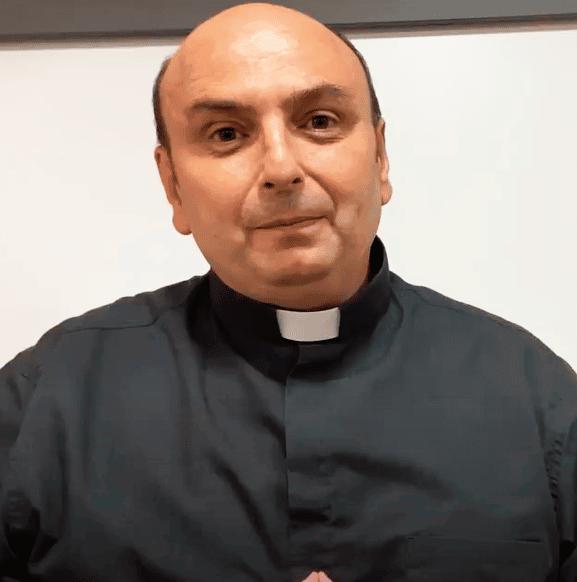
Community, said, "we will remember all you have shared in Iona Abbey and in this terrible situation the testimonies are a reminder that God is still present."
This solidarity will be important for Cardinal Pierbattista Pizzaballa, Latin Patriarch of Jerusalem, to hear during his current visit to Britain.
The international audience included Pax Christi members in Uruguay, Germany, Canada and the United States, "Know that many people in Belgium think of you every day, that many people push our government to take a stronger stance; strong wishes of solidarity for you," said Pax Christi Flanders. Caritas-Belgium: "Thank you so much for having organised this. Please convey our thoughts, solidarity, and prayers to the community at large. We are trying to do our best to support your efforts through Caritas Jerusalem." Friends and worshipers at the Cistercian Abbey of Gethsemani in Trappist, Kentucky, said "we pray for you daily and wish others around America knew and understood what is actually going on there - Peace To You!"
The Salesian Sisters of Don Bosco described, being "in communion with you all in prayer and through our offering in various ways; we are daily in contact with our sisters, their people and young people in West Bank, Israel and Lebanon... praying and working with them... Thanks for your courage and strength... Be blessed... We are with you all!" The Salesians of Don Bosco Network said: "May the world come to its senses - Salaam, Shalom, Pax". A representative of Vincentian priests and brothers prayed: "May God bless you and your people, may this tragedy end soon, may peace prevail and with it new life for everyone."
At the conclusion of the webinar, the Christmas message of the Heads of Churches in Jerusalem was read out over an image of candles burning in Church of the Nativity in Bethlehem before a Madonna and Child icon. This event was more than a call to awareness; it was an invitation to act, to pray, and to stand in solidarity with Palestinians in the Holy Land, who continue to endure, love, and hope against all odds.
Ellen Teague
"I appeal to Governments and the International Community, that a ceasefire may be reached on all war fronts by the Christmas celebrations."

Francis on Sunday launched a plea directly to political leaders and to the international community:
"I appeal to Governments and the International Community, that a ceasefire may be reached on all war fronts by the Christmas celebrations," he said during the Angelus prayer.
The Pope's words followed his request that all men and women of goodwill join in prayer for peace in war-torn countries worldwide.
"Let us continue to pray for peace, in tormented Ukraine, in the Middle EastPalestine, Israel, Lebanon, and now Syria - in Myanmar, in Sudan, and wherever people suffer from war and violence," the Pope appealed.

liverpoolcatholic.org.uk
"It is with great joy that I declare ... the cure... to be a miracle"
The Archbishop of Liverpool, Archbishop Malcolm McMahon has declared the case of John (Jack) Traynor a miracle.
President of the Lourdes Office of Medical Observations (BdCM), Dr Alessandro de Franciscis, asked Dr Kieran Moriarty, an English member of the International Medical Committee of Lourdes, to conduct a review of the file of John Traynor held in the archives at Lourdes.
Sufficient medical evidence enabled the archdiocese to reconsider the possibility that the cure of John Traynor might be declared miraculous.
His latest appeal comes as violence continues to rage in Gaza, where more than 40,300 people have been killed since the Hamas attack on Israel on 7 October 2023 and in neighbouring Lebanon where Israeli attacks have also escalated in the past months; as Ukraine recently marked the tragic milestone of 1,000 days from a full-blown Russian invasion of the country; in Myanmar where civil war has been ongoing since a military coup overthrew the government in 2021; in Sudan where fighting between the army and paramilitary rebels has killed over 60,000 people and displaced millions since April 2023.
The Pope also mentioned the volatile situation in Syria where the 14-year conflict has come to a head with the overthrow of President Assad's regime.
Jack was a pilgrim on the archdiocese's first official pilgrimage to Lourdes in 1923 and was cured dramatically of epilepsy, paralysis of the right arm and paraplegia during the pilgrimage.
The case has been believed to be miraculous from people across the archdiocese and beyond, but, despite an attempt in 1993, there has never been an official ecclesiastical declaration until today.
It is the 71st official miracle to have happened in Lourdes and the first person from England to be recognised.
At the time of the archdiocesan centenary pilgrimage to Lourdes in 2023, the current
Archbishop Malcolm said: “Given the weight of medical evidence, the testimony to the faith of John Traynor and his devotion to Our Blessed Lady, it is with great joy that I declare that the cure of John Traynor, from multiple serious medical conditions, is to be recognised as a miracle wrought by the power of God through the intercession of Our Lady of Lourdes.
“I hope that in February 2025, during the Jubilee Year, we will have a fitting celebration at the Metropolitan Cathedral to mark this significant moment in the history of our archdiocese, helping us all to respond to the Jubilee call to be ‘Pilgrims of Hope.’”
On 12 September 2024, the Feast of the Holy Name of Mary, the Archdiocese of Cardiff and Diocese of Menevia were united
On Monday 2 December 2024, at a solemn Mass in Saint David's Cathedral, Bishop, Mark O'Toole, received the Papal Bull appointing him as Archbishop of the new Archdiocese of Cardiff-Menevia. Bishop O'Toole's homily for the Proclamation of the New Archdiocese follows:
On 3rd September it was a real surprise to receive a phone call from the Nuncio letting me know that the Holy Father agreed that the Archdiocese of Cardiff and the Diocese of Menevia were to be united and this would be decreed on 12th September, the Feast of the Holy Name of Mary. We were of course hoping that decision would come but perhaps not as promptly as it did. That morning, I had read a passage from St Gregory the Great in which he describes his faith and his pastoral responsibilities. At one point, he says, "Who am I - what kind of watchman am I? I do not stand on the pinnacle of achievement, I languish rather in the depths of my weakness. And yet the creator and redeemer of mankind can give me, unworthy though I be, the grace to see life whole and power to speak effectively of it. It is for love of him that I do not spare myself in preaching him".
It is for love of Him, for love of Jesus, that we gather here today at this new beginning, as we receive and proclaim the Decree the Holy Father has sent us. It is because we want to have the faith of that Soldier we hear about in the Gospel, the Centurion. "Lord, I am not worthy that you should come under my roof, but only say the word, and I, and we shall be healed". This prayer we make every time we come to Mass. It comes just before the moment of intense intimacy with the Lord, when we receive Him in Holy Communion, take His Body and Blood into ourselves, so that we have the courage and confidence to go forth in His name, to bring Him to others.
Jesus marvels at the soldier's faith, at the confidence he has in Jesus. The centurion knows that if Jesus says the Word, it will be done. The soldier knows this experience from having to direct and guide others. "I say to one go and he goes, to another come and he comes, to my servant "do this" and he does it.".

We need the kind of confidence that this soldier had in Jesus. Lord we need this faith. The faith that like the Centurion's amazes you. You want us to trust you like he did. This is the faith that makes you marvel. This new beginning must be an invitation to deeper trust in you, to show our confidence in you, so that the world may marvel, be amazed.
Help us to come to you as Kyrios, as Lord, as the One who is the source of our joy, of our energy and our life. And to "Go" forth in your name, not go 'from you' but to go forward in the power and strength of your presence to those who do not know you, who have not had the beauty of an encounter with you. To go to those who are furthest away.
Lord, help us to do this in communion with one another, walking together, assisting each one to be able to participate more profoundly and deeply, so that all may have their voice and their part in bringing others to you. This is our Mission.
"Nawr, dim ond ychydig eiriau yn iaith hynafol Cymru. Mae'r seremoni hon yn atgof dyfnach o'r cysylltiad pwysig sydd gennym ag Olynydd Sant Pedr. Mae'r Tad Sanctaidd wedi anfon llythyr atom yn nodi ein hundeb newydd â'n gilydd. Mae'r Pab Ffransis yn ein hatgoffa mai dim ond oherwydd ein hundeb â Iesu y mae'r undeb hwn â'n gilydd yn bosibl. Boed heddiw i
helpu pob un ohonom 'Ddod' yn llawer agosach at Iesu, a rhoi'r dewrder inni 'Fynd' at eraill fel Ei ddisgyblion cenhadol."
Now, just a few words in the ancient language of Wales. This ceremony is a deeper reminder of the important link we have with the Successor of St Peter. The Holy Father has sent us a letter marking our new union with one another. Pope Francis reminds us that this union with one another is only possible because of our union with Jesus. May today help each of us 'Come' much closer to Jesus, and give us the courage to "Go" to others as His missionary disciples."
In the Gospel Jesus was amazed by the faith of one man - a Gentile soldier of all people, a stranger to the covenant, a man with limited understanding of the religious traditions, but a man who saw who Jesus for who He really isKyrios, Lord, the Son of God.
By admitting in humility his unworthiness to have Christ in his home, this man makes possible the invitation to have Christ in his heart. This man whose faith made Jesus marvel was not a disciple, did no miracles, established no churches, had no academic degree, and no religious title. His spiritual résumé was unimpressive. The man whose faith Jesus marvelled at, was a Centurion who knew who Jesus was, what he was able to do, and this gave him confidence. He asked Jesus
humbly, and trusted that he would receive what he needed. He showed he really believed in Jesus.
This is still the faith that makes Jesus marvel. Who are the centurions of our day, of our Archdiocese? Who are those men, women, young people, children, who amaze us by their faith? Who are the ones who are not put off by the seemingly overwhelming task of faith in Jesus in the present age? Who, despite the messages of death and destruction, are not overcome by their unworthiness, or the unworthiness of the Church, but see in this a further invitation to trust in Jesus, and to be courageous in bearing witness to Him?
Our new Archdiocese, needs priests, religious lay men and women, yes and an Archbishop too, who have this kind of faith. A faith which amazes others, so that we do not keep doing the same old, same old. Can we do something else, can we do something fresh and different? It could be something small or particular in our own personal lives. Or could it be something big and audacious, where we even interrupt Jesus, as the centurion did, and make Him marvel. God knows we need something unprecedented and new in our generation, in our society, in our Archdiocese.
May the Lord give us the courage to do it.
+Mark O'Toole Archbishop of Cardiff-Menevia




Dr Jay Kettle-Williams









Jesus, whose birth we celebrate at this time of the year, is acclaimed by all three Abrahamic religions: Judaism, Christianity and Islam which date back respectively some three and a half millennia, two millennia and to the eighth century. Over the intervening years, their sibling rivalry - some might regard as the ultimate form of internecine strife - has surely been enough to try the patience of all the saints, let alone Christ himself.
Patience, along with understanding, sits well within the Christian ethos. But neither of these two qualities has that get-up-and-go which we are ofttimes but only casually exhorted to adopt in our role as evangelists, nomenclature which I take in common parlance to mean ‘promoters’, ‘marketeers’.
The birth of the Christ Child gives the opportunity to bring focus among those of little or no faith not to the hedonism usurping this time of the year but to the Christian message which we are charged to impart.


The world of marketing, as opposed to selling, teaches us how important it is to broadcast what you are about, to declare your essence, to get your message across, to get what you need to say out there. Business speak with terms like rationale, aims, objectives and mission statement might not be to everyone’s liking when it comes to Christian evangelisation. But positioning statements, such as we do have and use in plenty, are instrumental in taking matters forward, in attracting the attention of target audiences. Perhaps we need to think more sharply along these lines.
The coats of arms and notably the corresponding mottoes, effectively positioning statements, of our bishops of England and Wales offer a fascinating field of study.
We have twenty-one dioceses in England and Wales, each led by an Ordinary (a bishop) with authority given by the Pope to exercise pastoral function over the local diocese. That gives an initial corpus of twenty-one bishops. To that number can be added any Co-Adjutor Bishops, those who assist diocesan bishops and have the right to succeed them, Suffragan Bishops, who lead a suffragan diocese within a larger ecclesiastical province but who have no assumed right of succession. Then there are others. They all add up to a grand total of some five thousand six hundred bishops worldwide supporting some 3,000 actual dioceses.
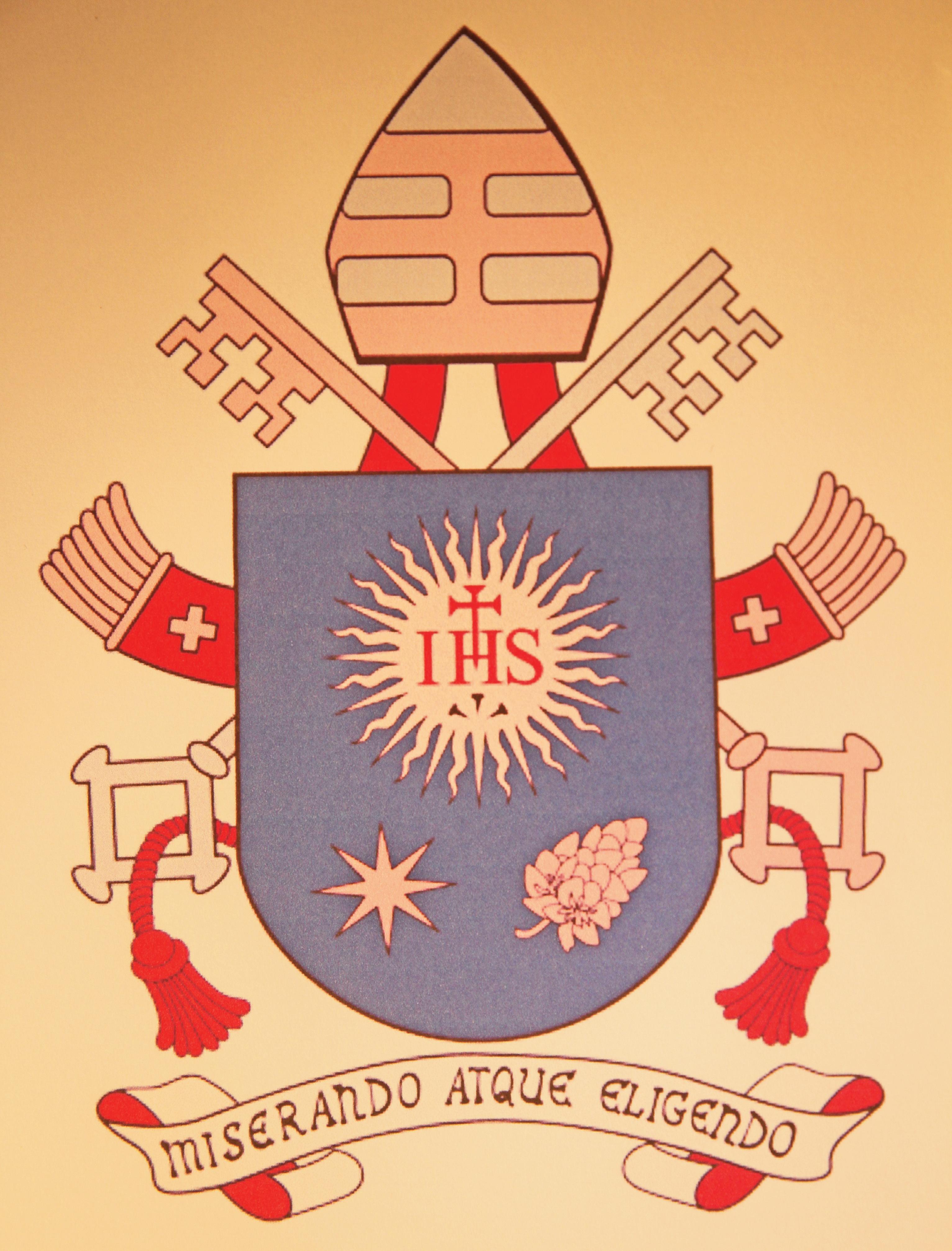
Well, I haven’t yet managed to read many of the ‘mottoes’ adopted by all the world’s Catholic bishops – I can’t even admit to having set myself that task – but those I have looked at and set about understanding are noticeable for their optimism, determination, sense of positive endeavour amid joy within Christ’s embrace. They form a wonderful bank of marketing material worth translation and explanation to audiences.
But it’s so sad these days when the vibes coming from churches across the land speak not of positivism but of managing decline: decline in the number of laity attending Church, decline in the number of vocations to the priesthood, decline in the revenue stream, decline in the standard of buildings. But, I say, let’s out with that gloom! For God’s sake!
So let’s join in full and open celebration of the new birth bringing new energy to ours, the
most diverse religion on the face of the planet.
Along with family, friends and colleagues I wish you all a Merry Christmas and a New Year full of health, happiness and all things positive.
Acknowledgements and Attribution: Texts/References adapted and/or adopted from http://en.wikipedia.org under the terms of the Creative Commons AttributionShareAlike License 4.0: http://creativecommons.org/licenses/bysa/4.0/;

Dr J L Kettle-Williams is an experienced business communications consultant and wordsmith (tutor, writer, translator).
Tenders are invited from organisations interested in the conservation and restoration of mosaics at Sacred Heart and St Catherine of Alexandria in Droitwich
It was recently announced the church had secured a grant from National Lottery players of nearly £190,000, thanks to The National Lottery Heritage Fund.
This funding will now go towards the £260,000 project of cleaning and conserving mosaics.
The walls of the church are covered with some of the finest venetian glass mosaic artwork in Europe and it welcomes thousands of visitors from across the UK and other parts of the world each year to see the astonishingly beautiful scenes.
But as time has passed the walls have suffered some degradation and need repair.
A detailed Commissioned Work Brief is now available on the parish website and tenders are invited to be received by Friday 10 January 2025. The contract will be awarded by the end of that month.
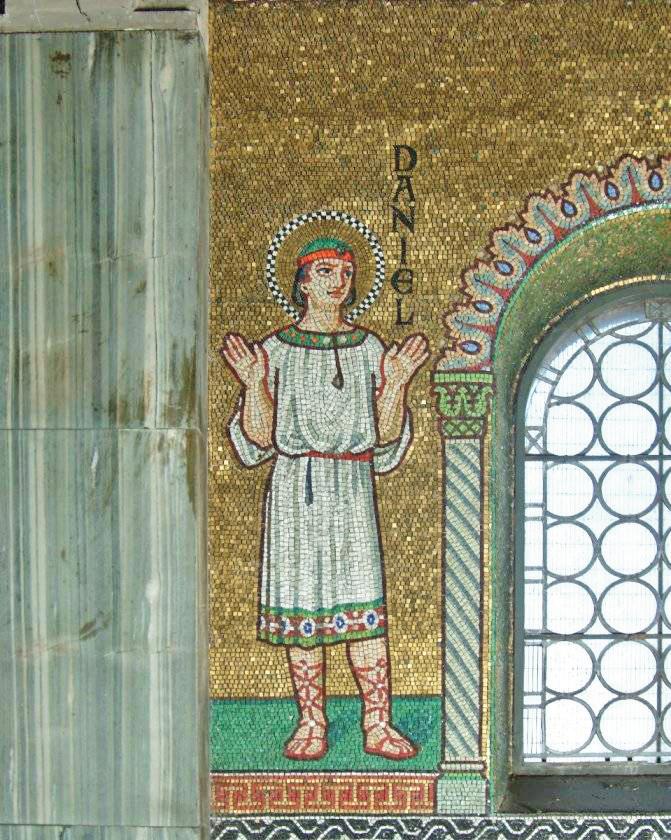
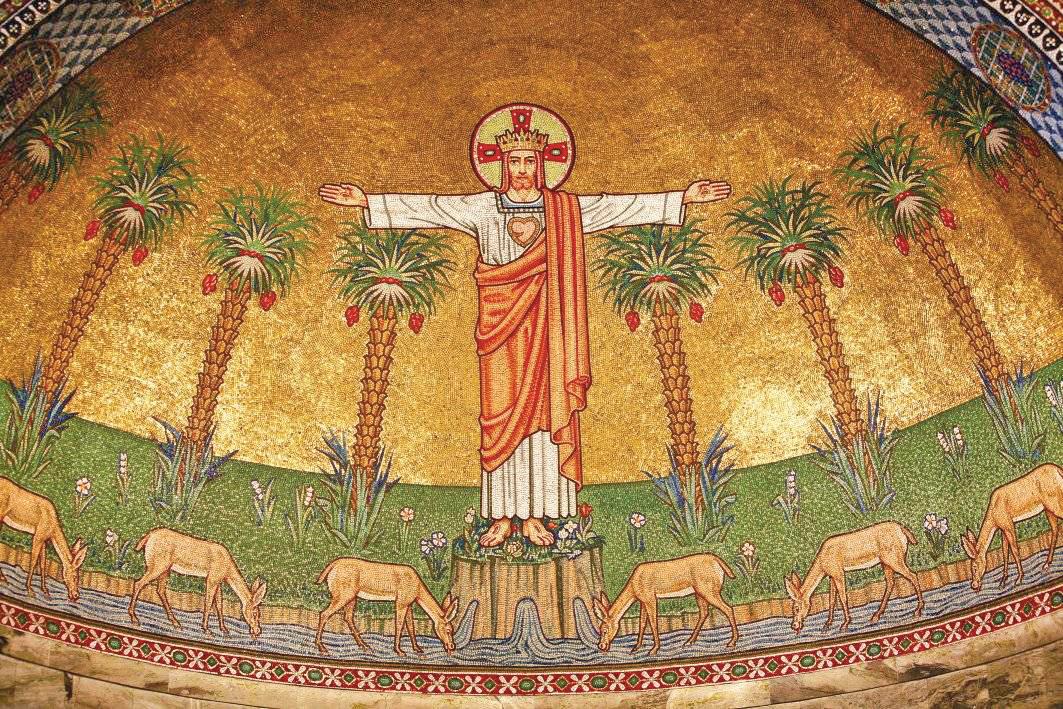
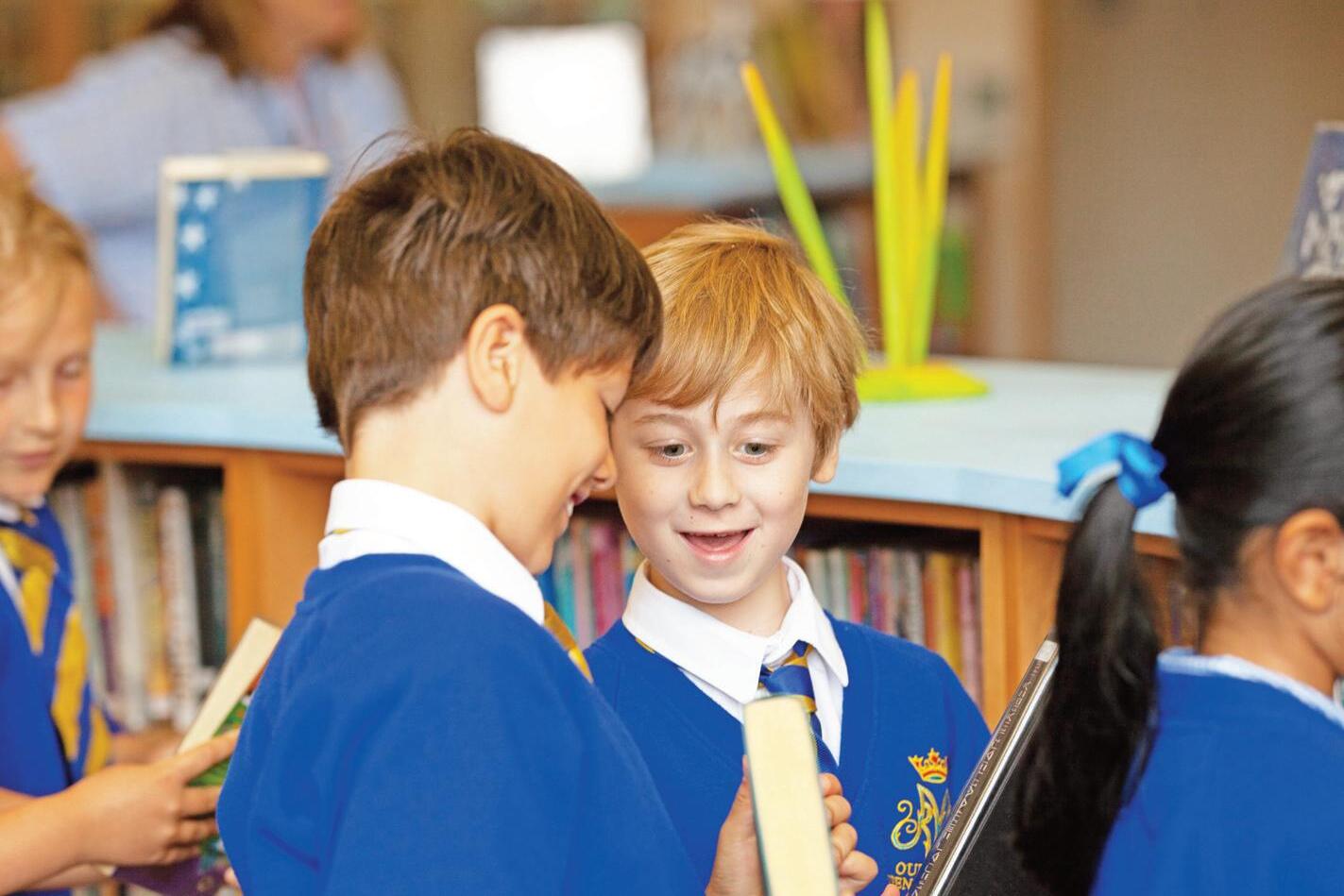

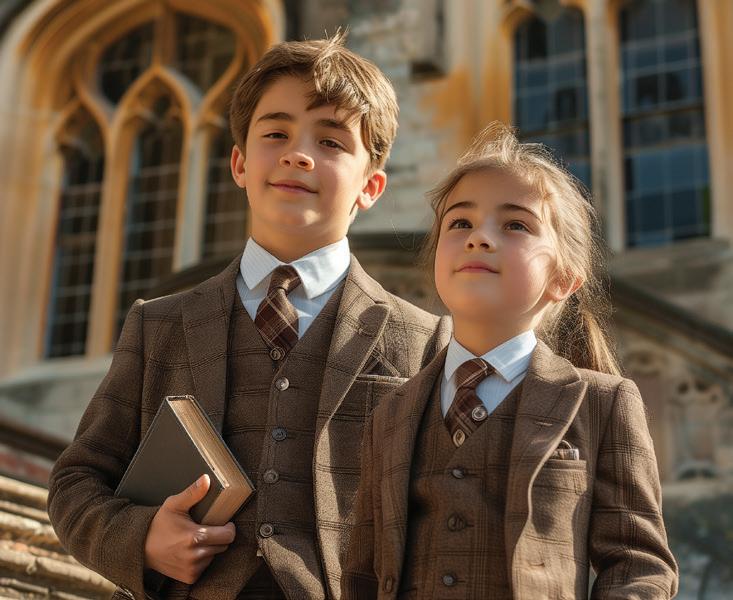


“Being an artist in Bethlehem is certainly more challenging but at the same time more meaningful.”
Bethlehem artist Lina Sleibi, together with London musicians, has released a Christmas 2024 song of hope from the town where Jesus was born over 2,000 years ago. Like last year, no festive lights and fancy decorations will illuminate the night skies of the Holy Land this Christmas. In response to this, Lina Sleibi with Cherrie Anderson from Ooberfuse, insist that when all is said and done, only love lights up a pathway for the future.
Lina Sleibi says: “Being an artist in Bethlehem is certainly more challenging but at the same time more meaningful. There are so many different challenges to live, feel and share each day. But however challenging these might be, nothing will ever silence the voice of love that speaks even in the darkness. The very spot where Jesus was born is in my little town of Bethlehem. Without the nourishment of love this tiny acorn would not have grown into a tree with branches spreading throughout every continent."
As a partner in this project, John Handal, the Music Producer from Bethlehem and the owner of RJ Music company has played a crucial role in bringing this collaboration to life. His commitment to the project reflects a shared vision of using music as a beacon of hope and healing in the region.
John says: "It is sometimes easy to forget that the birthplace of Jesus 2,000 years ago is located in modern day Palestine - in Bethlehem in the West Bank. Without this event in history there would be no Christmas for families to celebrate. Each year we have put on a musical event in Manger Square in the shadow of the Church of the Nativity. Because we have been unable to do this in recent years, instead we have wanted to share with our brothers and sisters around the world the joy we feel at the birth of our Saviour through music. Last year we released Hear Angel's Cry.
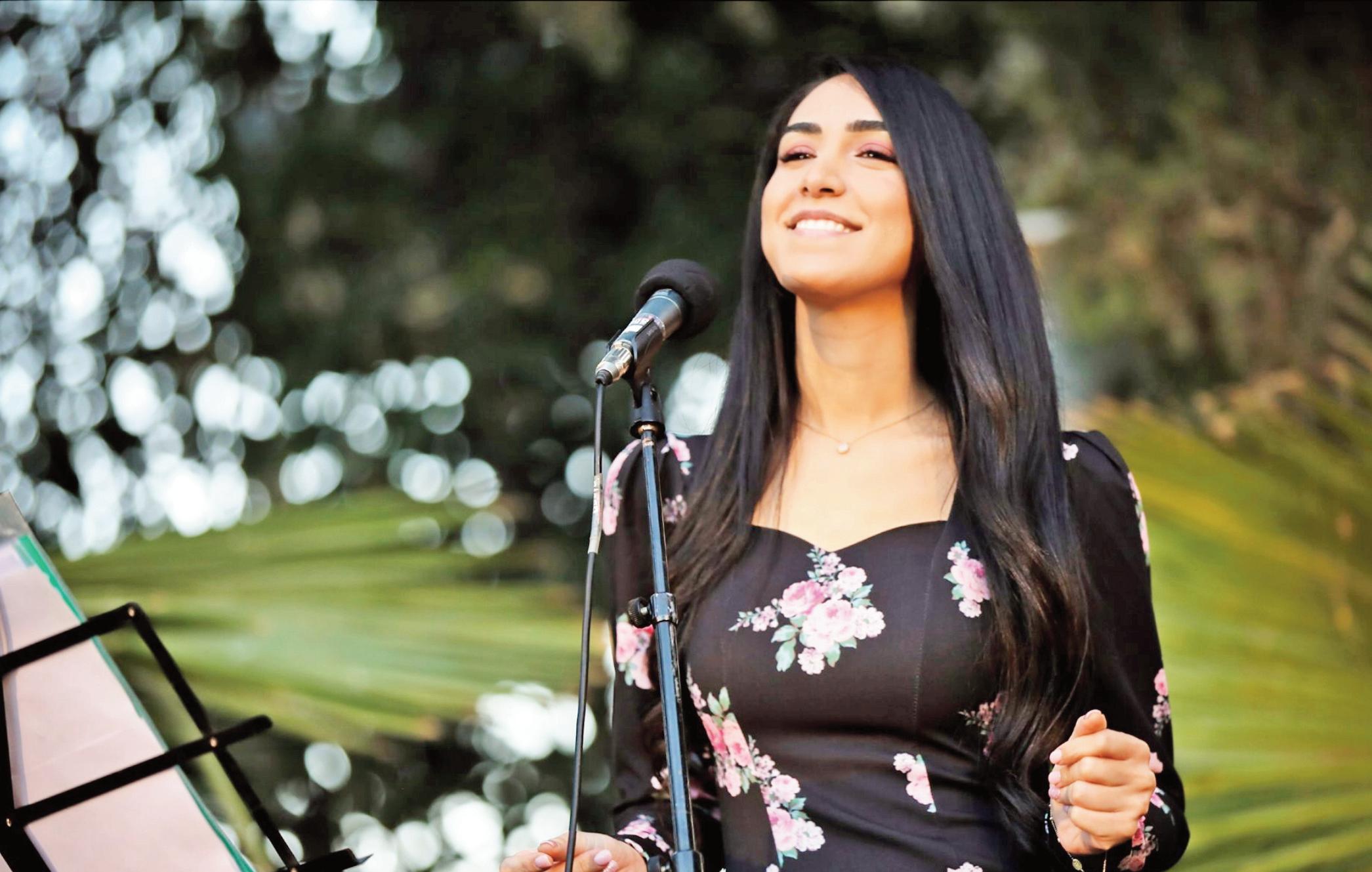
Hal St John from Ooberfuse, said: "Early last year we visited Bethlehem as pilgrims. During our stay we met a local music producer John Handal and formed a deep friendship that is at
Anderson said: "From Jesus' birthplace, in the vaults of the Church of the Nativity in Manger Square, God's love was born into the world. Lina shows us that when this love is born into our hearts, it silences the noise and chaos around us and offers us a way out of our troubles."

For over a year, the people of Sudan — one of the largest countries in Africa — have suffered under a brutal civil war that has reduced the capital, Khartoum, to a war zone.
Amid the chaos and a complex set of competing political interests, children and the poor have been hit hardest.
Recently, the United Nations confirmed that 35 children were among those killed in one of the war’s deadliest attacks to date. All told, at least 15,550 people have reportedly been killed in the fighting and some 10 million people have been displaced, many internally.
An overwhelmingly Muslim country, Catholics made up roughly 5% of the population of Sudan before the most recent war and played an important role in schools and education. But now, many missionaries and religious communities have had to flee the country, and parishes, hospitals, and schools have ceased their activities. In Sudan’s neighboring country, South Sudan, the Church maintains a large presence and remains very active in relief efforts.
The papal charity Aid to the Church in Need, which supports persecuted Christians throughout the world, remains active in Sudan. Kinga Schierstaedt, head of ACN’s projects in Sudan, told CNA last week that they know of 10 Catholic priests remaining in the Khartoum area, plus five Salesian sisters. Schierstaedt said Catholics in the country have had to be resourceful and adaptable amid an everchanging situation.
“For example, the Comboni Missionaries, who had been running a university in Khartoum, moved all teaching online and were thus able to continue teaching their students. In April of this year, the first set of students, who had all fled Khartoum and live currently either within the country or in neighboring countries, were able to complete their exams,” Schierstaedt said.
Schierstaedt said ACN has documented several lootings of churches, convents, and presbyteries amid the violence and destruction.
“At the beginning of the war, many project partners told us that this mainly happened because the attackers assumed that there was gold to be found in the churches and presbyteries. They were therefore mainly after the material possessions. Secondly, churches
were also often attacked because the attackers knew that refugees were staying there,” she explained.
“However, we are now increasingly hearing that these acts of destruction are also more and more directed against the Christian faith. Many of the remaining priests, for example, no longer use their own vehicles for fear that they could be taken away from them,” she continued.
What brought Sudan to this point?
Sudan’s current civil war began in April 2023, with warring factions the Sudanese Armed Forces (SAF) and Rapid Support Forces (RSF) led by two rival generals. But before this point, the country had been racked with turmoil for decades with multiple conflicts.
Because of its large size and geographical position, Sudan has long served as a crossroads between the Arab and African worlds. Historically, the country is extremely diverse, with Muslims and people of animist faiths primarily in the north and Christianity prevalent in the south. Religious and cultural differences as well as battles for the country’s vast natural resources, including oil and gold, have long fueled conflicts.
Beginning even before Sudan gained its independence from the British in 1956, the country’s 1955–1972 first civil war ended with the creation of the Southern Sudan Autonomous Region (which would later secede and become South Sudan).
Sudan’s next major conflict, a 22-year second civil war beginning in 1983, was to be even more devastating — it was one of the deadliest conflicts since World War II, with more than 2 million people killed. Instances of famine recorded in the Darfur region in particular shocked the world.
In the midst of that conflict, Omar al Bashir, a hardline Islamist, overthrew the democratically elected government in 1989. He imposed a harsh interpretation of Sharia law on the country and persecuted religious minorities, including Christians. In 2003, he cracked down on rebels in the Darfur region, killing an estimated 300,000 people; fighters also

committed numerous atrocities including sexual violence.
Fearing he would be deposed in a coup as he himself had seized powe.r, al Bashir tried to coup-proof himself by creating two militaries, the paramilitary RSF and the “official” SAF, whom he hoped would never collaborate with each other to overthrow him.
Finally, in 2005, a peace agreement was signed with the SPLA, a significant rebel group in South Sudan. The most important part of this agreement, Schierstaedt said, was a referendum on the independence of the south, which passed overwhelmingly and led to the separation of the two states in 2011. South Sudan, despite taking 75% of Sudan’s oil wealth, remains one of the world’s poorest countries, having suffered under its own civil war since 2013.
In 2019, amid popular uprisings against al Bashir, the president was, as he had feared, deposed in a military coup after 30 years in office. The RSF and SAF collaborated to achieve the coup.
Al Bashir was succeeded by a military council, and in October 2021, a new charter was signed with the aim of creating a constitution, which Sudan has lacked since 2005.
However, there was another coup and a nationwide state of emergency was declared, though the prime minister ousted in the coup was quickly but briefly reinstated. Fighting then broke out between the SAF and RSF on April
Photograph: Father Jacob Thelekkadan
15, 2023, for control of the country. In the absence of any kind of functional civilian government, Sudanese Gen. Abdel Fattah al Burhan of the SAF has de facto ruled the country ever since.
The RSF has captured almost every city in the Darfur region and has been accused of war crimes and ethnic cleansing.
The ordinary citizens of Sudan have suffered years of bombing amid the war, as a recent story from ACI Africa, CNA’s news partner in Africa, explains. Nearly 18 million people across the country are currently experiencing “acute” food insecurity.
Saudi Arabia and the United Arab Emirates, both major investors in the Sudanese economy, are seen as players in a proxy war as both countries are sponsoring fighters that serve their interests in the country. The Russian paramilitary mercenary organization The Wagner Group has also been active in the conflict.
“Many international players ask about how many millions of USD are needed to help Sudan in this humanitarian crisis. But they do not ask about how to stop those who ‘sponsor’ the war,” Schierstaedt noted.
Pope Francis has renewed his appeal for peace in Sudan, calling on the country’s warring parties to lay down their weapons and stop the fighting. The SAF recently rejected a U.S. call to return to peace talks with the RSF.
Jonah McKeown
The Anti-Bullying Alliance believes that children and young people should actively participate in decisions that affect them
Students at St John the Baptist School, Woking, visited the House of Lords this week, in recognition of their work with the Young AntiBullying Alliance (YABA).
YABA was set up by the Anti-Bullying Alliance in 2022, to influence its project and programme work, help develop the messaging and campaign of Anti-Bullying Week, and to provide general feedback on bullying to help the organisation to include young people’s views in their work. The Anti-Bullying Alliance believes that children and young people should actively participate in decisions that affect them.
YABA gives young people the opportunity to share what is important to them when it comes to bullying issues, and contribute to projects, programmes and campaigns. They are provided with training opportunities such
as social media marketing training, media training and anti-bullying training, and the chance to influence the annual Anti-Bullying Week campaign that reaches millions of children and young people across the UK.
This year, three girls from St John the Baptist contributed to the 2024 Anti-Bullying Week campaign. Both Oliwia and Teagan were invited to the House of Lords by Baroness Kidron to chair the charity's Anti-Bullying event, speaking to their patrons. This included Manchester City’s Ruben Dias and Andy and the Odd Socks band. The girls then were interviewed by BBC Bitesize.
A representative of the school said: “We are incredibly proud of the girls and what an amazing job they did at representing the school at such an exciting opportunity!"
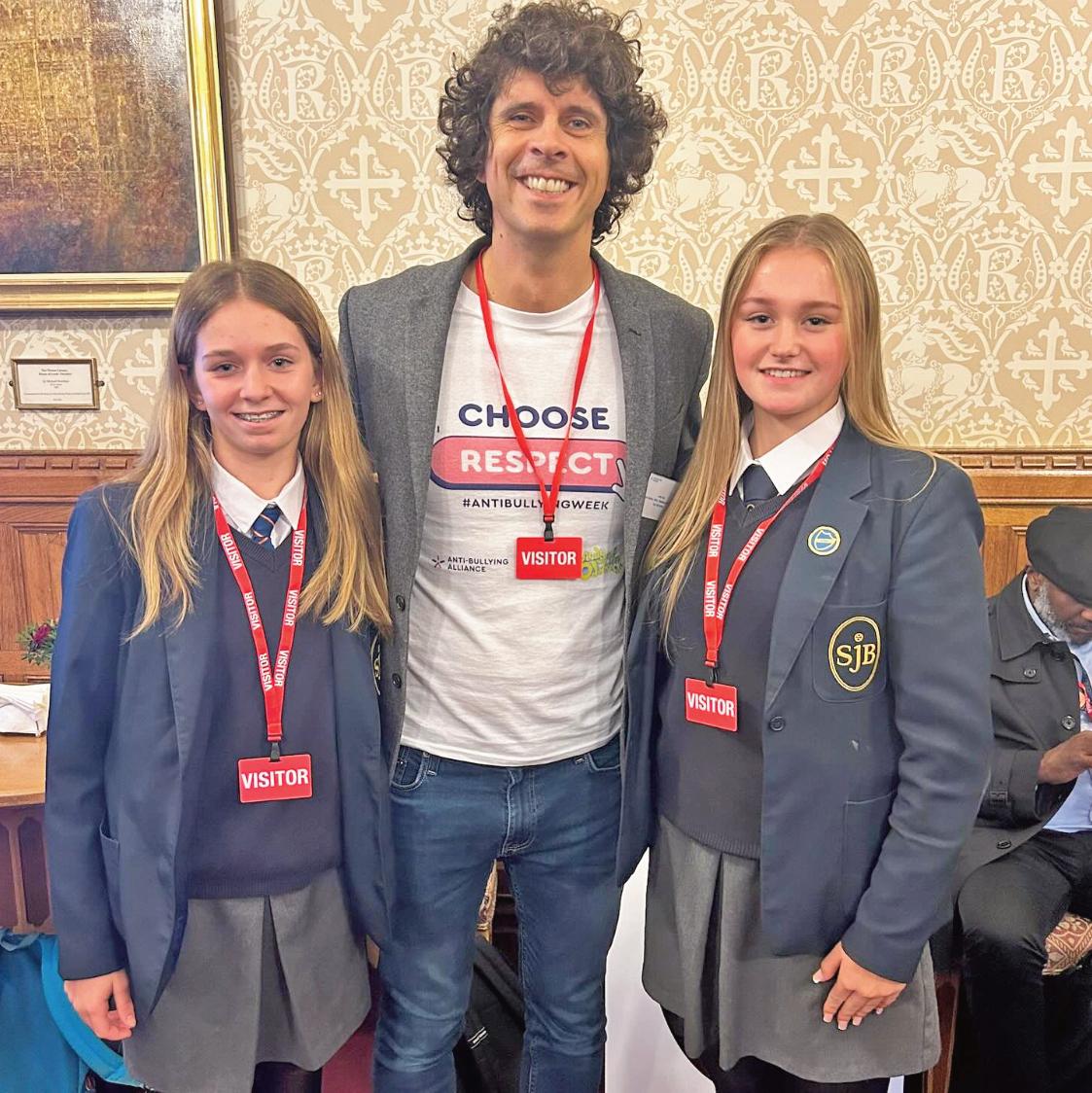
The cathedral has a long tradition of supporting the families and survivors, and will continue to do this.
Birmingham Cathedral was privileged to hold the Service of Remembrance for the 50th Anniversary of the Birmingham pub bombings on Thursday 21 November. The Cathedral was full to capacity with survivors of the Bombings, families of the twenty-one people who were killed, and the people of Birmingham.
It was particularly important, with the aftermath of the Bombings, that the Archbishop of Birmingham, The Most Reverend Bernard Longley, preached the sermon, with Bishop Michael officiating.
Archbishop Bernard gave a message of hope, love and challenge among all the pain that the day gives:
“Wounds leave scars and scars are a reminder of the trauma but also of the healing and they're often stronger than what they have replaced."
During the Prayers, twenty-one candles were lit on the altar as the names of those who were killed were read out, while, at the end of the Service, the bell tolled twenty-one times. People left in silence to lay wreaths at the Monument in Cathedral Square.
The Service was broadcast live on BBC WM and on the cathedral's YouTube channel.
In the morning, we held a Healing Through Remembering event with Maureen Slattery Marsh from the Birmingham Spiritual Direction Forum and Jonny Clark and Sylvia Gordon from the Corrymeela Community. This reflective and meditative time gave people a space to pray and think through the spiritual challenges following from terror attacks.
The cathedral has a long tradition of supporting the families and survivors, and will continue to do this.
Photograph: Armin Zamanian birminghamdiocese.org.uk
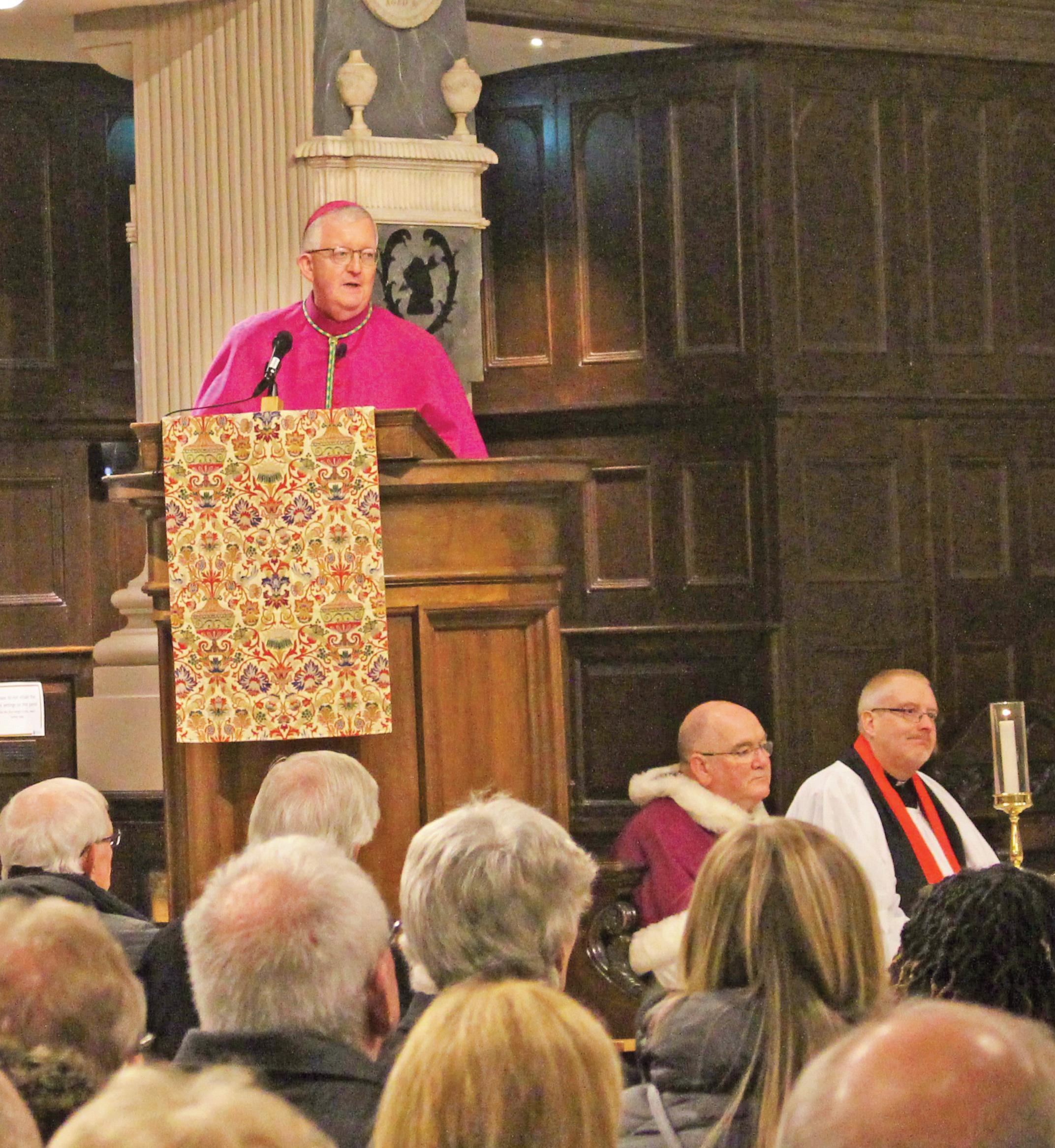
We ask the Catholic community to pray that members of parliament will have the wisdom to reject this bill at a later stage in its progress
Following the decision of MPs to vote in favour of the Terminally Ill Adults (End of Life) Bill at the Second Reading today (Friday 29 November), Bishop John Sherrington, Lead Bishop for Life Issues, said:
“We are disappointed that MPs have voted in favour of the Terminally Ill Adults (End of Life) Bill progressing through parliament. We believe that this bill is flawed in principle and also contains particular clauses that are of concern. We ask the Catholic community to pray that members of parliament will have the wisdom to reject this bill at a later stage in its progress.
“In addition to being opposed to the principle of assisted suicide, we are particularly

concerned with clauses in the bill that prevent doctors from properly exercising conscientious objection, provide inadequate protection to hospices and care homes that do not wish to participate in assisted suicide and allow doctors to initiate conversations about assisted suicide. We ask that these voices be heard in the next stages of the Bill to strengthen the deep concerns about this proposed legislation.
“We have expressed the view, during this debate, that genuine compassion involves walking with those who need care, especially during sickness, disability and old age. The vocation to care is at the heart of the lives of so many people who look after their loved ones and is the sign of a truly compassionate society. It is essential that we nurture and renew the innate call that many people have to compassionately care for others.
“It remains the case that improving the quality and availability of palliative care offers the best pathway to reducing suffering at the end of life. We will continue to advocate for this and support those who work tirelessly to care for the dying in our hospices, hospitals and care homes.”
Photograph courtesy of the Bishops' Conference
Vatican Media
A team of specialists from different Mercedes locations worked for almost a year with representatives from the Vatican to build a car tailored to the Pope's needs
On Wednesday 4 December, MercedesBenz presented Pope Francis with a new eco-friendly popemobile - a convertible, electric G-Class vehicle. At Pope Francis' request, the entire team who worked on the vehicle was present for the delivery.
The CEO of Mercedes-Benz, Ola Källenius, said building the unique vehicle was "a great honour for us, paying attention to all the Holy Father's needs."
The Pope will greet pilgrims at the next papal event in St Peter's Square in this popemobile, specifically designed for him for the Jubilee Year.
Pope Francis' current popemobile is a hybrid gasoline-powered G-Class for his weekly General Audiences.
A team of specialists from different Mercedes locations worked for almost a year with representatives from the Vatican to build a car tailored to the Pope's needs.
One of the main priorities was zero emissions, as the Vatican plans to convert all its vehicles to emission-free by 2030-a goal they share with Mercedes.
"We are moving towards zero emissions and are launching many electric products," the CEO explained. "This year we launched the electric G-Class."
This car was made one of a kind, specifically for Pope Francis. "Compared to the original vehicle, many things changed in terms of the base, so the starting point was different," Peter Zotter, who works in the development division at the Graz factory where the G-Class models are produced, explained.
The new electric car includes a rotating seat and handcrafted interior furnishings. Additionally, it offers all-wheel drive, designed

particularly for the low speed the popemobile is often driven through St Peter's Square during public audiences.
Mr. Zotter described the vehicle as "a unique piece with all the features," and he expressed his hope that "it will provide the Holy Father with the comfort he needs for his travels."
The Pope's new and improved car is also equipped with a retractable roof to protect him from the elements. The right side back door is
built on rotating hinges, while the left is completely welded.
Yet with all the modern touches of the 2025 popemobile, tradition is still factored in. Like its predecessors, the car is white and has the license plate SCV 1 (State of Vatican City).
For nearly 100 years, Mercedes has worked with the Vatican to provide the 'popemobile.' The first one was given to Pope Pius XI in 1930.
Staff have continued their tradition of donating Christmas presents for children at the St Francis Family Centre, a local charity supporting families in need
Bishop Challoner Catholic School in Tower Hamlets hosted a heart-warming Advent celebration on Wednesday, 4th December, with two very special guests—Rocky and Taffy, the donkeys. Organised by Sixth Form students with support from the chaplaincy team, the event brought together pupils, local schools, and the wider community to share in the joy and hope of the season.
Children from the St Francis Family Centre and students from St Mary and St Michael’s Primary School delighted in meeting the donkeys while enjoying hot chocolate and mince pies. Christmas music filled the air, with the parish church serving as a beautiful backdrop symbolising the unity of this East London community.
The Advent season at Bishop Challoner has also been marked by meaningful acts of service. Staff have continued their tradition of donating Christmas presents for children at the St Francis Family Centre, a local charity supporting families in need. These gifts ensure no child goes without on Christmas Day. The Centre works tirelessly to provide outstanding early years education for disadvantaged children, and many of its long-serving staff are proud alumni of Bishop Challoner.
In addition, the school has partnered with the Jesuit Refugee Service (JRS) in Wapping, collecting essential items such as clothing, food, and toiletries for refugees without access to asylum support. Students have also been writing Christmas cards with messages of hope for individuals in detention centres, underscoring the school’s commitment to compassion and inclusion.
“Advent is about joy, generosity, and hope,” said School Chaplain James Johnston. “Bishop Challoner has been a proud part of the East End for almost a century. This event, and our wider advent appeals each year give our young people the chance to demonstrate the power of community during this special season - just as the Sisters of Mercy, who founded our school did for so many years."
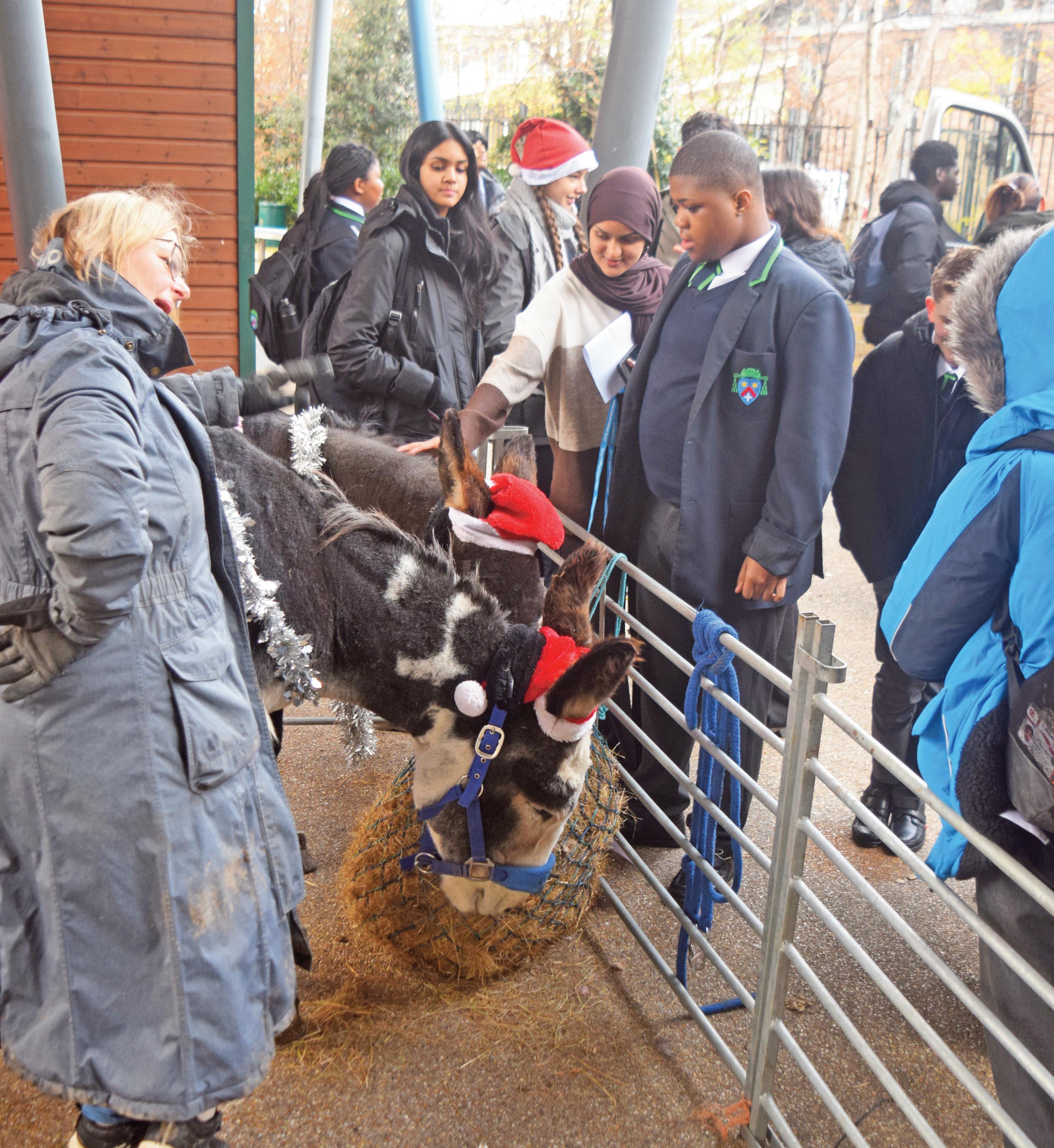

You can use both sets of clues to solve the puzzle: the solutions are the same.
CRYPTIC Across
1 Cases I select at random for the book (12)
8 Concentrated exchange of Russian using little American money? (7)
9 Widespread looting at first during search (5)
10 Nets second following corner (5)
11 Stay in bed to read Punch, perhaps (3,4)
12 Obtain a new piano sound, but there's no intro to give one a clue (4,2,7)
15 Japanese massage some Muslims, and after time, American's back (7)
17 Up to now more than one's being abominable (5)
19 Hand needs week to bring on puppy (5)
20 Still, it is the road back after stagnation (7)
21 Decision at pontoon bridge: maybe it's one too far? (5,2,5)
CRYPTIC Down
1 What cohesion? Everyone's different (4,2,3,3)
2 Georgia's study, majoring in dance (5)
3 Money nearly stretches to the Orient in subscription which covers two continents (7)
4 Carol's nice dull bijou building (2,5,6)
5 Lost cat after a little way, following fish (5)
6 See Jeff Endicott's lodging in address out east (7)
7 Scanned to get rub, something that's good for blocked pipes (12)
13 Virginia, one at home being the most self-important (7)
14 Critical point for resort in Florida (3,4)
16 Subject of river stems from a line on a map (5)
18 Sounding impatient but no good leaving when all are playing together (5)
QUICK Across
1 One of the OT's Wisdom Books (12)
8 Focused (7)
9 Weapon (5)
10 Ensnares (5)
11 Don't get up early from bed (3,4)
12 Get wind of something; suspect (4,2,7)
15 Japanese form of acupuncture (7)
17 Legends of the Himalayas (5)
19 Cub; pup (5)
20 Sloth; passivity (7)
21 Dilemma in pontoon to hold what you have or gamble by taking another card (5,2,5)
QUICK Down
1 Saying that everyone has a right to have different preferences (4,2,3,3)
2 Latin American dance with dancers in single file (5)
3 Unbroken landmass from the Atlantic Ocean to the Pacific (7)
4 Christmas song anglicized as Good Christian Men, Rejoice (2,5,6)
5 Alley cat, for example (5)

6 Title of respect from the Ottoman Empire (7)
7 Chesty cough medicine (12)
13 Most conceited (7)
14 Resort at the southernmost tip of Florida (3,4)
16 Subject matter (5)
18 In music, 'to be performed by the entire ensemble' (5)